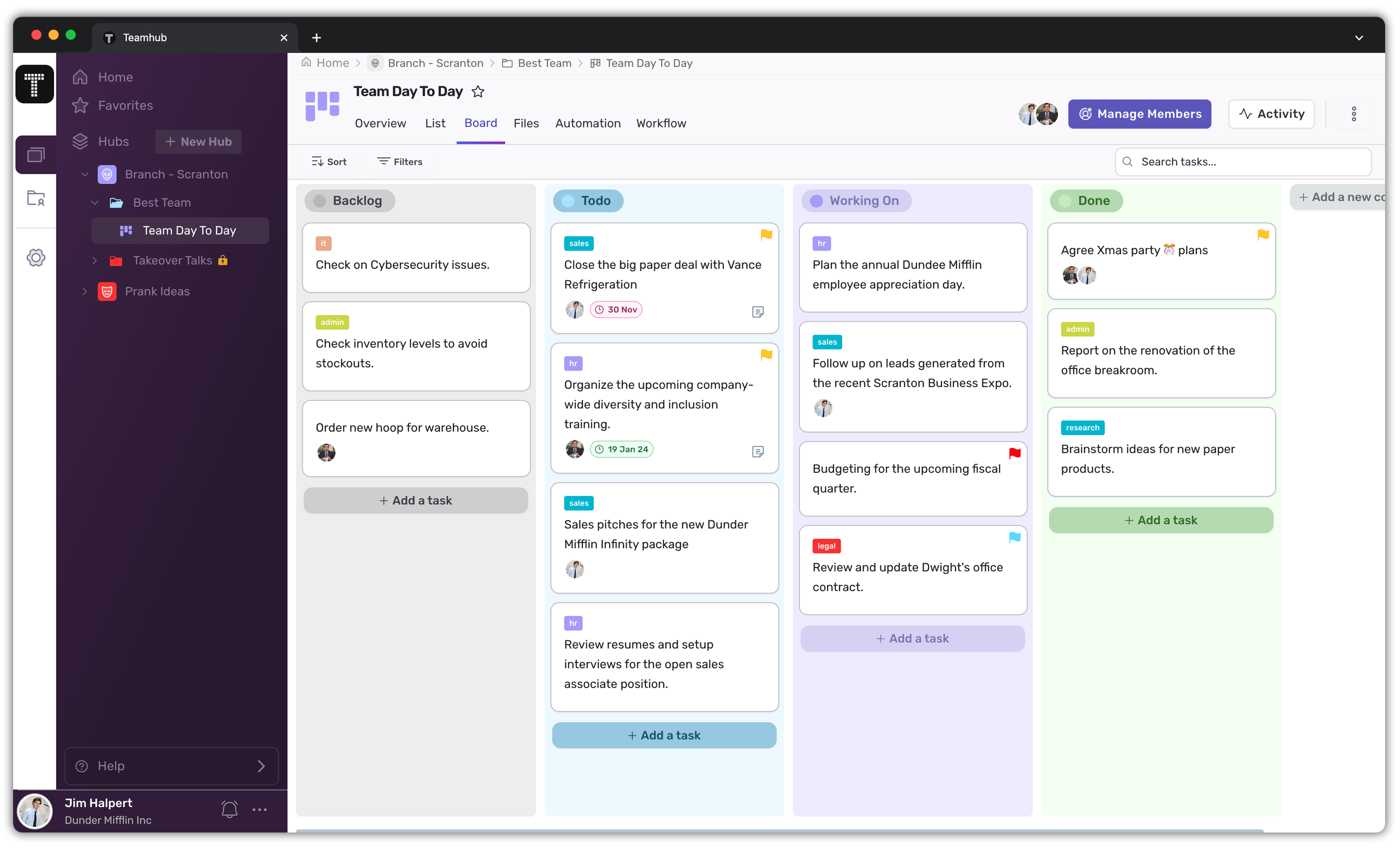Task coordination is crucial for the success of any business. With an increasing number of tasks and projects to manage, businesses are turning to task coordination platforms to streamline their operations. In this comprehensive guide, we will explore the key factors to consider when choosing the right task coordination platform for your business. From understanding the basics of task coordination platforms to evaluating different types, this guide aims to help you make an informed decision that aligns with your business needs.
Understanding Task Coordination Platforms
Task coordination platforms are software tools designed to facilitate the organization, management, and tracking of tasks within a business. They provide a centralized location where teams can collaborate, assign tasks, set deadlines, and monitor progress. By leveraging task coordination platforms, businesses can improve productivity, enhance communication, and ensure that tasks are completed efficiently.
What is a Task Coordination Platform?
A task coordination platform is a software solution that enables businesses to manage their tasks and projects effectively. It offers features such as task assignment, deadline tracking, progress monitoring, and collaboration tools. These platforms provide a single dashboard where teams can access all relevant information, communicate with each other, and work together to achieve project goals.
Task coordination platforms have become increasingly popular in recent years due to the growing complexity of business operations. With teams spread across different locations and time zones, it has become crucial to have a centralized system that ensures everyone is on the same page. These platforms eliminate the need for endless email chains and confusing spreadsheets, making task management more streamlined and efficient.

Importance of Task Coordination in Business
Efficient task coordination is essential for businesses to stay organized, meet deadlines, and deliver high-quality work. When tasks are not properly coordinated, there can be confusion, overlapping responsibilities, and a lack of accountability. Task coordination platforms help businesses overcome these challenges by providing a structured framework for task management and ensuring that everyone is on the same page.
One of the key benefits of task coordination platforms is improved communication. With a centralized platform, team members can easily communicate with each other, ask questions, and provide updates. This eliminates the need for constant back-and-forth emails and ensures that everyone has access to the most up-to-date information.
Furthermore, task coordination platforms enable businesses to track progress and identify bottlenecks. Managers can easily see which tasks are on track and which ones are delayed, allowing them to take proactive measures to keep projects on schedule. This level of visibility also helps in resource allocation, as managers can identify areas where additional support may be needed.
Key Features of Task Coordination Platforms
Task coordination platforms offer a wide range of features to support effective task management. Some key features to look for include:
- Task assignment and delegation: Assign tasks to team members and delegate responsibilities.
- Deadline setting and tracking: Set deadlines for tasks and track their progress towards completion.
- Progress monitoring and reporting: Monitor the status of tasks and generate reports to track overall progress.
- Collaboration and communication tools: Provide tools for team members to collaborate, communicate, and share updates.
- Document sharing and version control: Allow team members to share documents and maintain version control to ensure everyone is working with the latest information.
- Integration with other business tools: Integrate with other software tools, such as project management or customer relationship management systems, to streamline workflows and improve efficiency.
- These features work together to streamline task coordination and improve team collaboration. When evaluating different task coordination platforms, consider whether they offer the necessary features to meet your specific business requirements.
Unlock Efficiency with Teamhub

Factors to Consider When Choosing a Task Coordination Platform

Choosing the right task coordination platform for your business requires careful consideration of various factors. By assessing your business needs, evaluating platform usability, considering integration capabilities, and analyzing cost and value, you can make an informed decision that aligns with your unique requirements.
Assessing Your Business Needs
Before selecting a task coordination platform, it is essential to assess your business needs. Consider the size of your team, the complexity of your tasks, and the specific requirements of your industry. Identify the pain points and challenges that you need to address through a task coordination platform. By understanding your business needs, you can select a platform that caters to your specific requirements.
For example, if you have a large team spread across different locations, you may need a platform that offers robust communication and collaboration features. On the other hand, if your tasks involve complex workflows and dependencies, you might prioritize a platform that provides advanced project management capabilities.
Additionally, consider the scalability of the platform. As your business grows, you want a platform that can accommodate increasing demands and adapt to evolving needs.
Evaluating Platform Usability
Usability is a crucial factor when choosing a task coordination platform. The platform should be intuitive and user-friendly, allowing teams to onboard quickly and navigate the interface effortlessly. Look for platforms that offer customizable dashboards, drag-and-drop functionality, and clear visualizations of task progress.
Furthermore, consider the learning curve associated with the platform. Will your team require extensive training to use it effectively? A platform that offers comprehensive documentation, tutorials, and customer support can help streamline the onboarding process and ensure a smooth transition.
During the evaluation process, involve key stakeholders and end-users to gather feedback on the platform’s usability. Their input can provide valuable insights into how well the platform aligns with your team’s workflow and preferences.
Considering Integration Capabilities
Task coordination platforms should seamlessly integrate with your existing business tools and workflows. Integration capabilities allow for a smooth transfer of data and enable teams to work cohesively across multiple platforms.
Consider the platforms’ integration options with tools such as project management software, communication tools, and calendar applications. For example, if your team heavily relies on a specific project management tool, ensure that the selected task coordination platform can integrate with it seamlessly. This integration will help avoid duplicate data entry and streamline collaboration.
Moreover, assess the platform’s compatibility with other systems your business uses, such as customer relationship management (CRM) software or time tracking tools. The more integrated your task coordination platform is, the more efficient and streamlined your workflows will be.
Analyzing Cost and Value
When selecting a task coordination platform, it is essential to consider both the cost and the value it provides. Evaluate the pricing structure of different platforms, considering factors such as the number of users, storage capacity, and additional features.
While cost is an important consideration, it should not be the sole determining factor. Assess the long-term value the platform offers, considering the potential impact on productivity, efficiency, and collaboration within your organization.
For instance, a platform that offers advanced analytics and reporting capabilities can provide valuable insights into team performance and task progress. This data-driven approach can help identify bottlenecks, optimize resource allocation, and improve overall productivity.
Additionally, consider the platform’s scalability and flexibility. Will it adapt to your changing business needs without significant disruptions or additional costs? A platform that grows with your business can provide long-term value and avoid the need for frequent platform migrations.
In conclusion, choosing the right task coordination platform requires a thorough assessment of your business needs, evaluating platform usability, considering integration capabilities, and analyzing cost and value. By taking these factors into account, you can select a platform that empowers your team to collaborate effectively, streamline workflows, and achieve optimal productivity.
Types of Task Coordination Platforms
Task coordination platforms come in various types, each with its own set of advantages and considerations. When choosing a platform, it is important to understand the different types available and determine which one aligns best with your business needs.
On-Premise vs. Cloud-Based Platforms
On-premise task coordination platforms require installation on your own servers and provide you with complete control over your data. Cloud-based platforms, on the other hand, are hosted on the provider’s servers and offer easy accessibility from anywhere. Consider factors such as data security, customization options, maintenance requirements, and scalability when choosing between the two types.
Industry-Specific Platforms
Some task coordination platforms cater specifically to certain industries, offering specialized features and functionalities tailored to their needs. These industry-specific platforms can provide industry-specific templates, workflows, and integrations that align well with your business requirements. Evaluate whether an industry-specific platform would be more suitable for your business compared to a generic platform.
General vs. Specialized Platforms
General task coordination platforms offer a broad range of features and can be used across various industries and businesses. Specialized platforms, on the other hand, are designed for specific use cases or departments within a business. Consider your business requirements and the level of customization required to determine whether a general or specialized platform is the best fit.
Making the Final Decision
Once you have evaluated different task coordination platforms based on the factors mentioned above, it’s time to make the final decision. To ensure a seamless transition and successful implementation, consider conducting a trial run, gathering team feedback, and reviewing customer support and service.
Conducting a Trial Run
Before committing to a platform, it is advisable to conduct a trial run within your organization. Select a few platforms that meet your requirements and set up a trial period. Allow teams to use the platforms and evaluate their functionality, usability, and compatibility with existing workflows. A trial run allows you to experience the platforms in action and make an informed decision based on real-world usage.
Gathering Team Feedback
Involve your teams in the decision-making process. Gather feedback from those who will be using the platform on a day-to-day basis. Consider their opinions, suggestions, and concerns to ensure that the selected platform meets their needs. This collaborative approach not only helps in making the best decision but also fosters a sense of ownership and involvement among team members.
Reviewing Customer Support and Service
Customer support and service are indispensable when it comes to task coordination platforms. Review the support options provided by the platform vendors, such as documentation, tutorials, and customer service channels. Consider the responsiveness and effectiveness of their support team. A reliable support system ensures that any issues or concerns are addressed promptly, ensuring a smooth experience for your teams.
By following this comprehensive guide, you can make an informed decision when choosing the right task coordination platform for your business. Prioritize your business needs, evaluate different platform options, and involve your team in the decision-making process. When implemented effectively, a task coordination platform can revolutionize the way your business manages tasks and projects, leading to increased productivity, improved efficiency, and enhanced collaboration.
0 thoughts on “A Comprehensive Guide to Choosing the Right Task Coordination Platform”